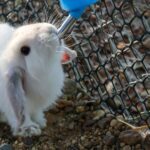Dental health is very important when you are caring for a rabbit. It plays a role in keeping your pet healthy. Most pet owners overlook the importance of the rabbit’s oral system. That is why their pet suffers from dental diseases that affect the body.
Like with other species, the main purpose of teeth and mouth is to break down food. According to Locust Family Dentistry, the mouth is the first step in keeping internal parts of the body working. When your rabbit eats, it uses its mouth to digest and get nourishment. The mouth sends the pieces of food down to the stomach and distributes the nutrients throughout the body.
But there are times when problems occur in your rabbit’s dental health. You must understand this topic to help your pet avoid further risks. Keep reading to learn more about rabbits and their dental health.
Read More: The Ultimate Guide to Taking Care of Rabbits
Anatomy of Rabbit’s Teeth
To better understand your rabbit’s dental health, you must have a background in its anatomy. In total, rabbits have 28 teeth, as confirmed by the North Seattle Veterinarian. They have six teeth on each side of their upper jaws, five on each side of their lower jaws, four incisors, and two peg teeth.
The cheek teeth function like human teeth. It helps your rabbit grind and breaks down food for better digestion. At the same time, large incisors are sharper than the cheek teeth. It is used to cut and slice food into smaller, bite-sized chunks.
A rabbit’s teeth are open-rooted, meaning they will grow throughout her life. That is why you need to check it to avoid abnormal growth.
Role of Dental Health in Rabbits
Again, dental health in rabbits is important. They help your pet acquire and break down the food into smaller pieces to avoid stomach problems. Since the rabbit digestive system is sensitive, most of your pet’s food intake affects their overall function. The food you offer rabbits is crucial because it can upset their stomach.
Rabbits are classified as herbivore animals, meaning they are grass feeders. It is rich in fiber that helps your pet’s teeth to be sharp and healthy and improves their metabolism.
Everything about your rabbit’s anatomy is interconnected. If one of them fails, complications will occur one after another.
Importance of Keeping Dental Health
1. Dental Health Affects the Overall Function of Rabbit
Since the dental system of the rabbit serves as the first step to acquiring nutrients, it is essential to keep it healthy. This will help your pet avoid nutrient deficiency in its body. Once the rabbit experiences dental problems, they tend to lose their appetite because of the discomfort and pain. Now if the rabbit is not eating, where else will it get the energy and nutrients?
2. Dental Health Avoid Tooth Decay
Rabbit teeth’ main role is grinding and breaking down the food for better digestion. But there are times when rabbit teeth decay. There are various reasons why it can happen to your pet. One improper nutrition. Two chewing on hard things. Three accidents. And last, not cleaning the rabbit teeth.
If you regularly ensure that your rabbit’s dental health is good, it helps avoid tooth decay. According to the People’s Dispensary for Sick Animals (PDSA), tooth decay happens to rabbits because of a lack of fiber nutrients. It is also painful for your pet which is why it has a risk of losing appetite in rabbits.
3. Dental Health Helps Detect Oral Diseases
Another advantage of regularly checking the dental health of rabbits is you can detect if your pet is having problems or not. You must keep an eye on possible problems even if you think they are eating fiber-rich food. That will help you avoid further complications and treat the rabbit immediately.
Common Signs of Dental Problems in Rabbits
1. Loss of Appetite
One common sign that you may notice in rabbits is their refusal to eat their regular meal. This is often due to dental problems, which can be painful and make it difficult for rabbits to chew on their food. It is crucial for rabbits to maintain a healthy diet, as they rely on it for energy and essential nutrients, especially fiber. The dental system and other body systems of rabbits are interconnected, meaning that problems with their teeth can lead to issues with other parts of their bodies as well.
2. Teary Eyes
The eyes of the rabbit are also affected if your pet encounters problems in their dental health. The eyes are located near the root canal of the rabbit. Often if your rabbit feels pain from tooth decay, they tend to become teary, affecting the vision.
3. Teeth Grinding
Teeth grinding is sometimes seen in rabbits to express their contentment. But you must be careful in distinguishing the different teeth-grinding sounds. Occasionally, rabbits grind their teeth hard as a sign of sickness. They do it because of a painful wound or discomfort in their body.
4. Oversleeping
Rabbits suffering from tooth decay may sleep more than usual due to the pain they are experiencing. Normally, rabbits sleep for 8-9 hours a day, but when they are sick, they may prefer to rest in their cage rather than engage in other activities. This is because the pain from dental disease can make it difficult for them to do anything else.
Diagnosing Dental Disease
One way to know if your pet has a dental disease is to go to your trusted veterinarian and do a proper diagnosis. The doctor will ask about the history of your pet because it is a contributing factor to how to treat your rabbit. Each case of dental disease differs from one rabbit to another.
Another factor that needs to be considered is their age, breed, and weight. Moreover, the doctor will also conduct physical, specimen, and x-ray examinations. These tests will help the vet assess what is wrong with your rabbit.
Keeping the Dental Health of Rabbit
It’s easy to maintain the dental health of your rabbit. Rabbits are fiber-food fodder, so naturally, it helps them keep their teeth strong and healthy. If you ensure that you feed your pet with nutritional foods daily, keeping their teeth in good condition is no problem.
Consider giving your pet a chew toy or treats to keep the teeth sharp and strong. But be careful when choosing chew toys for your pet; ensure that it is not too hard to avoid tooth loss.
You should also check their teeth once in a while to see if it is decaying. If you are having problems, contact your vet immediately and ask for assistance. They are expert people you can rely on, especially if it concerns the rabbit’s health.
Key Takeaways
- Ensuring the dental health of rabbits is important. It is interconnected with other body parts, so if it fails to do its role, problems will occur one after another.
- The Locust Family Dentistry article stated that the mouth is the first step to acquiring nutrients in rabbits. It is also a process of good digestive function in your pet.
- The mouth and teeth break down the food that rabbits eat every day. It helps your rabbit’s stomach to digest the nourishment and distribute it all over its body.
- Rabbit has a total of 28 teeth. It has a different function to help your pet chew and keep the dental system healthy. Their teeth consist of six on each side of their upper jaws, five on each side of their lower jaws, four incisors, and two peg teeth.
- Here is the importance of keeping your rabbit’s dental health functioning; healthy dental health affects the other body system, avoids tooth decay and other problems, and helps the owner detect dental issues immediately.
- Keep an eye out for these common signs; loss of appetite, teary eyes, teeth grinding and oversleeping.
- Diagnosing dental problems in rabbits has a lot of considerations. Ensure that you provide the doctor with the histories of your pet, like age, breed, and weight. The doctor will also conduct different examinations and tests to properly diagnose and provide treatment to avoid further risks.


